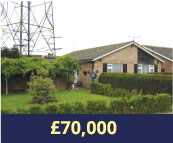In the news: The Farmers Guardian

Pesky pylons on property could become a most valuable resource
If you have old high-voltage pylons or electricity lines crossing your property, you could be eligible for a large compensation payment, says a specialist land agent.
Cambridgeshire-based Ben Lenton points out most of lines were constructed on annual wayleave agreements. “Many land and property owners do not realise they can be terminated. If this happens, the electricity company has to remove the lines or pay fair compensation.”
But why is this compensation available? “High voltage overhead lines and pylons cause significant blight to property values, where they can be seen from the farmhouse or cottages,” says Mr Lenton.
They affect residential property because people do not want to live next to them. They also affect agricultural land because it is more expensive to farm around them. Some of the largest claims arise where they cross land which may be developed.
“This is because houses or industrial units cannot usually be built under them. Any new houses next to the lines will be harder to sell and less valuable.” He suggests farmhouses can be devalued by as much as 20 per cent to 30 per cent where pylons run very closely.
“Many such claims run into six-figure payments. Ideally, the pylon needs to be within 200 metres of the property for a claim to be viable. If none of the pylons are actually on the property but the lines cross it, then the lines need to be within 50m.”
Mr Lenton says it should be noted that small wooden pole lines do not usually give rise to a significant compensation payment unless they are of 33kV capacity.
Visual impact
“Other things in addition to the visual impact cause devaluation. The perceptions by the general public relating to electromagnetic fields and their effect on health is one example. Whether or not there is a true link is yet to be fully proven. Most land and property owners do not realise that they have a right to compensation for the loss in value. If the electricity line is near to but not crossing land owned, it is not possible to claim. Similarly, if a lump sum has been paid in the past, then no claim can be made." he says.
"Large claims also result where pylons and lines cross land with development potential. It is often possible for lines to be removed, run underground or for compensation if they are to remain."
Mr Lenton says most claims are reached by agreement without them becoming too contentious or proceeding to a Wayleave Hearing. However, there are many unique quirks which can catch the unwary or inexperienced adviser. There are also other matters that require negotiation in addition to the compensation figure to ensure a landowner’s interests are not compromised." His advice is to use a firm of specialist chartered surveyors on a ‘no-win no-fee’ basis.
Article originally published on 05/02/2010 in the Farmers Guardian.









